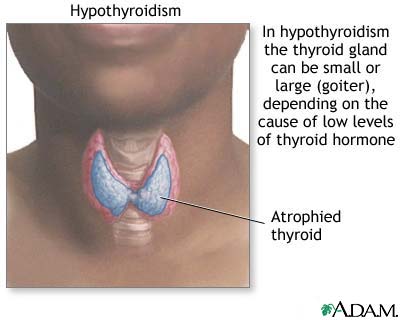Written by, Rhonda McGriff; Registered Nurse- Critical Care, Jacksonville District: April 21, 2015
Have you ever found yourself feeling extra tired and sluggish? Gaining some extra weight? Always feeling cold? Losing hair? Or maybe you have experienced the exact opposite with feelings of not being able to fall asleep, anxiety, nervousness, weight loss, and always feeling hot. If you are able to identify with either group of symptoms it just might be time to make a visit to your doctor to have your thyroid checked.
The thyroid is a butterfly-shaped gland that sits in the front of your neck. It is a very important gland in your body that makes hormones. Those hormones are then sent throughout our bloodstream to all of the cells and organs in our body to help them function properly. When your thyroid doesn’t produce enough hormones or too much hormones, it can cause things in our bodies to get off balance. The thyroid gland “regulates your body temperature, keeps your brain thinking clearly, your heart pumping rhythmically, and basically maintains harmony among all organs in your body (Hook, 2014)” 
Too much thyroid hormone is known as hyperthyroidism. Too little thyroid hormone is known as hypothryroidism.
Symptoms of Hyperthyroidism can include:
- increased heart rate with abnormal rhythm or pounding (palpitations)
- high blood pressure
- increased body temperature (feeling unusually warm)
- increased sweating
- clamminess
- feeling agitated or nervous
- tremors in the hands
- feeling of restlessness even though the person is tired or weak
- increased appetite accompanied by weight loss
- interrupted sleep
- frequent bowel movements, sometimes with diarrhea
- puffiness around the eyes, increased tears, sensitivity to light, or an intense stare
- bone loss (osteoporosis)
- stopped menstrual cycles (Descornet, 2014)

Symptoms of Hypothyroidism can include:
- coarse and dry hair
- confusion or forgetfulness (often mistaken for dementia in seniors)
- constipation
- depression
- dry, scaly skin
- fatigue or a feeling of sluggishness
- hair loss

- increased menstrual flow (women)
- intolerance to cold temperatures
- irritability
- muscle cramps
- slower heart rate
- weakness
- weight gain (Descornet, 2014)
Thyroid disease can be easily detected by a simple blood test that can be done by your primary care provider. There are various treatment options for thyroid issues.
Sources:
Hook, D. (2014, December 23). What Every Woman Should Know About Thyroid Disorders. Retrieved April 12, 2015, from http://www.everydayhealth.com/womens-health/what-women-need-to-know-about-thyroid-disorders.aspx
Descornet, G. (2014, May 18). THYROID HORMONES - Women Health Info Blog. Retrieved April 12, 2015, from http://www.women-info.com/en/thyroid-hormones/
First Image Source: http://www.md-health.com/Thyroid-Disease.html
Second Image Source: http://www.women-info.com/en/thyroid-hormones/
Third Image Source: http://endocrinesurgery.ucla.edu/images/adm_hypothyroidism.jpg


